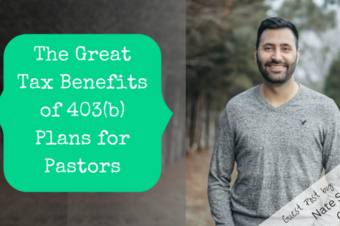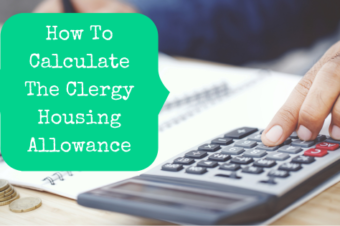
The Apostle Paul told Timothy in 1 Timothy 5:17-18 that “The elders who direct the affairs of the church well are worthy of double honor, especially those whose work is preaching and teaching. For Scripture says, “Do not muzzle an ox while it is treading out the grain,” and “The worker deserves his wages.” (NIV)
I agree. You are worth your wages. But what are your wages?
We commonly think of wages as simply your salary, what you get paid to work. However, compensation can be a whole lot more than just a salary. This is especially true for pastors because of the unique opportunities that you have access to. There are a number of different things that comprise compensation, but they can be broken into two basic categories: income and benefits.
Ministerial Income
Income is actual money that’s coming to you. It’s something tangible that you can put in your bank account.
Salary
A pastor’s salary isn’t much different than anyone else’s salary. It’s money that you get paid for doing a job. You have to pay taxes on the money and you get to do whatever you want with it.
Social Security & Medicare Offset
Pastors are dual-status taxpayers for Social Security purposes and thus have to pay both the employee and employer portions of that tax. If you’re not familiar with that, follow the link in the last sentence or none of this will make sense to you.
Some churches feel bad that pastors have to pay the employer portion of the Social Security and Medicare taxes and want to help them cover the cost. They calculate how much an employer would normally pay for the pastor, 7.65%, and pay that as additional salary. It is a nice gesture and definitely helpful to the pastor. Nevertheless, a Social Security and Medicare offset is simply additional taxable income in the eyes of the IRS.
Housing Allowance
Another type of income unique to ministers is the housing allowance. This site has all kinds of articles related to the housing allowance and I even wrote a book on it.
Basically, the housing allowance is income that is exempt from federal income taxation and can only be used for qualified housing expenses. It is also exempt from most state income taxes as well. Nevertheless, it is not exempt from Social Security & Medicare taxes.
Equity Allowance
The final type of pastoral income is specific to pastors who live in a parsonage. A parsonage is church-provided housing. As such, a pastor who lives in a parsonage does not have the opportunity to build home equity. When the ministry position is gone, the pastor has to start from scratch with housing.
This is the opposite experience for most Americans who purchase a home. As they pay down their mortgage and home values rise, their equity increases. Many people are able to pay off their mortgage by the time they retire so that they have lower housing expenses in retirement and a valuable asset that they can pull equity from if necessary.
Pastors who live in a parsonage often find themselves at retirement homeless and equity-less. To make up for that, many churches pay their pastors an equity allowance to help build towards purchasing a home in retirement. If they pay it directly to the pastor’s retirement account, it receives tax benefits and the pastor cannot access it for other things until retirement. If it is given as a cash payment, it is treated as taxable income by the IRS.
Ministerial Benefits
While income is money that you get, benefits are more of services or products provided to you. They are not cash and will not grow your bank account, but they are still very important to your overall financial life.
Health
One of the most valuable benefits that an employer can provide is health insurance. It is much more expensive to purchase health insurance as an individual than through a group policy. Also, premiums paid through an employer-sponsored health insurance plan are tax-free. Other health-related benefits that churches can provide to all of their employees are dental and vision insurance, health reimbursement arrangements, flexible spending accounts, or health savings accounts if in conjunction with a high-deductible health insurance plan.
Life Insurance
Another benefit that is helpful to both the pastor and the church (because they would want to care for the pastor’s family if anything happened) is life insurance. Up to $50,000 of group term life insurance can be provided tax-free and the premiums on any amounts above that are considered taxable income to the pastor (based on specific IRS calculations).
Disability Insurance
Most pastors are at greater risk of becoming disabled than dying. As such, disability insurance is a very valuable benefit. Like health insurance, it is also much more affordable when purchased as part of a group plan rather than as an individual.
Retirement Savings
A retirement savings account, usually a 403(b), is a benefit that has multiple advantages for pastors. Not only are pastors able to save for retirement pre-tax, but having a church-sponsored retirement plan makes it possible to claim a housing allowance in retirement and also entirely avoid paying Social Security and Medicare taxes on contributions.
Paid Leave
Even God took time to rest. As such, it is important for pastors to have access to paid leave (and a culture where they are encouraged to take it). It can be broken down in different ways, but paid leave can include sick days, holidays, vacation time, family leave, professional development, outside ministry, and sabbaticals. It is also important for the church to respect the pastor’s time off and pitch in to get work done while the pastor is away.
Parsonage
All of the other benefits (not income) listed here can be given to all church staff but a parsonage is only for ordained, licensed, or commissioned ministers. A parsonage is a church-owned home that a pastor gets to live in income tax-free.
Those are the different pieces that can be fit together to create a ministerial compensation package. Both pastors and their churches should understand these different components in order to create a tax-efficient compensation package that meets the pastor’s needs. Pastors, share this with whoever in your church makes salary decisions, whether it’s a board of directors, stewardship committee, an HR department, or whoever. Sit down and review it together to make sure your church is fulfilling 1 Timothy 5 to the best of its ability.



